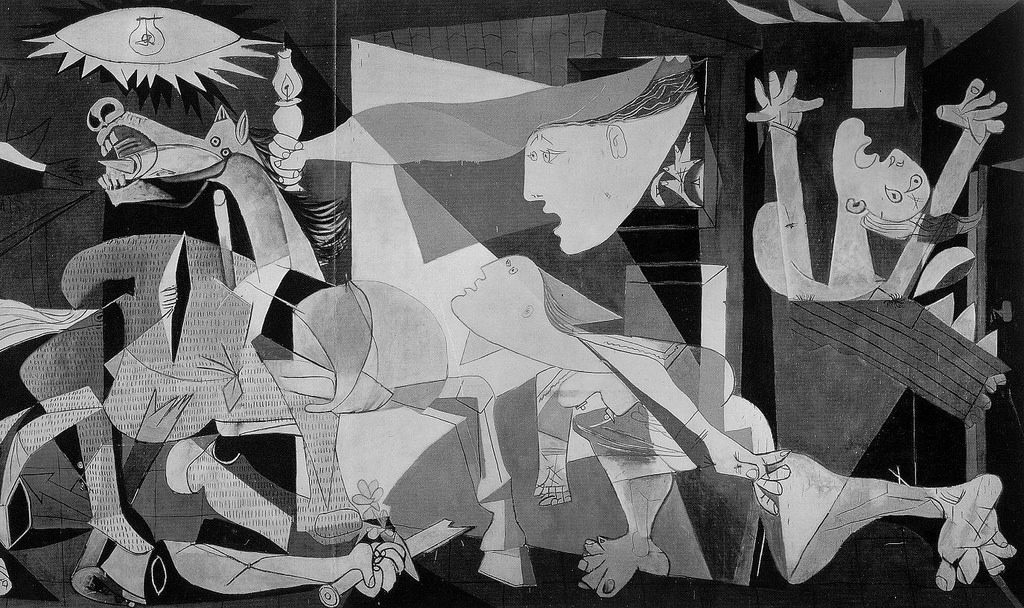How should I listen to Jazz? This disarmingly simple question is actually quite hard to answer. So this lesson seeks to explain how to listen to Jazz. But before we tackle this question let’s first answer a related one: Why should I listen to Jazz?
Why should I listen to Jazz?
People can listen to Jazz for many different reasons:
- for enjoyment;
- to challenge themselves and push them out of their comfort zone;
- as a learning experience to steal ideas to incorporate into your own playing;
- for culture signalling so you can show people that you’re a real sophisticated cool cat.
And, to be honest, I think most people listen to Jazz for some combination of all those reasons, and probably others.
Sausages & The Sublime
There are also two opinions on how to appreciate art. The first is that greater understanding allows for greater appreciation. The idea that you can better appreciate Picasso’s beautiful painting ‘Guernica’ if you know something about Cubism, Modernism, Abstraction, Symbolism, the Spanish Civil War, and Fascism.

But the second is that greater understanding destroys the magical and mystical aesthetic of art. That the cliché of ‘no one wants to see how the sausage is made’ applies to art. Philosophers call it a feeling of the sublime. Something incomprehensible and ineffable. And as you learn more and more about a topic, you slowly lose that feeling of the sublime. If you are of the second then stop reading now.
How to Listen to Jazz
Genres of music (or art), by definition, have certain features or traits that are prevalent in the genre. That’s what makes a collection of songs fall into a particular genre. The genre is defined by similarities between songs. And knowing these ‘features’ of Jazz allows you to better follow what’s happening through the performance, and thus better appreciate the creativity of the artists and the song itself. But you need to really listen. This isn’t just casual background music listening, you really need to pay attention. Listen to the song 5 or 6 times and really try to figure out what the soloist is doing and what they are thinking. Below is my personal list of ‘how to listen to Jazz’. Though keep in mind that this is a subjective list, and there are no doubt other things you can listen for, but this is a good start.
High Level:
- Head-Solo-Head form
Low Level:
- Tension & resolution
- Playing inside (esp. Guide Tone Targeting)
- Playing outside
- Patterns
- Repetition
- Sequences
- Motivic Development
- Cycled Patterns
- Call & response
- Scales & Licks
- Diatonic Scales
- Blues scale
- Blues licks
- Melody
- Fragments of the melody
- Interactions between band members
- Call & response between rhythm section & soloist
- Motivic transfer between soloists
- Balance of tension & resolution between rhythm section and soloist
- Conversation between band members
- Harmony
- ii-V7-I’s
- Bass movement by a 5th
- Chromatically descending chords
- Leave the chord progression/form
Pick Your Level
Hearing all these elements will obviously take a bit of practice. But that’s why we’re here. That’s what we are trying to learn. Most Jazz performances have some combination of these elements. But it’s important to know your level. If you’ve never listened to Jazz before, don’t dive straight into Free Jazz. You’re not going to know what’s going on, it’s going to sound terrible and you’re going to lose interest. You have to start with something you’re comfortable with and slowly build up to the more adventurous stuff as you gain confidence. If you’re listening to a piece of music and you have no idea what is going on, then take a step back down and pick something simpler. Now, while it’s impossible to categorise every artist into a perfect little pigeonhole as generally they evolve and change over their careers, the following is just a very rough guide as to where to start and where to move on to:
| Lighter | Moderate | Heavier |
|---|---|---|
| Count Basie | Miles Davis | Thelonious Monk |
| Duke Ellington | Bill Evans | Charlie Parker |
| Louis Armstrong | Sonny Rollins | Cecil Taylor |
| Chet Baker | Oscar Peterson | Charles Mingus |
| Dexter Gordon | Herbie Hancock | Wayne Shorter |
| Coleman Hawkins | Art Tatum | Ornette Coleman |
| Lester Young | John Coltrane (earlier stuff) | McCoy Tyner |